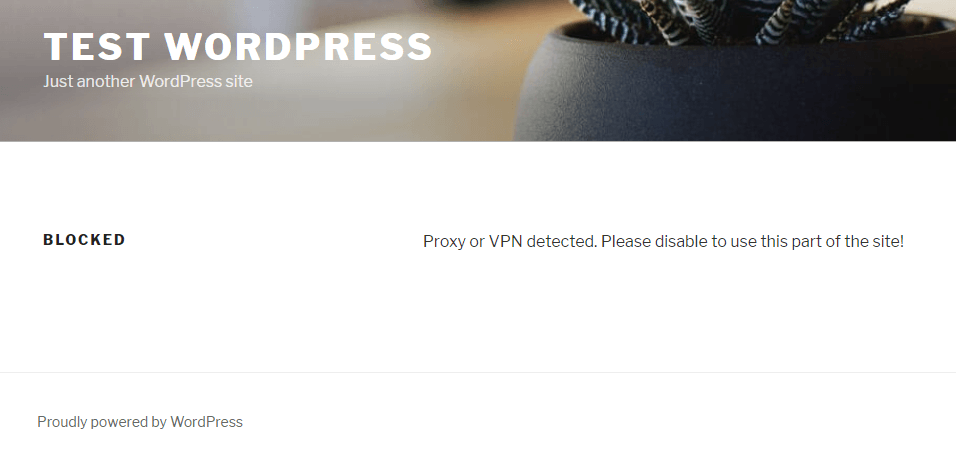VPN blockers: pros and cons


Hackers are actively working 24/7 to attack websites and steal data, and WordPress sites are not exempt from this danger. In some ways, the popularity of WordPress makes it an easier target, with over 42 known entry points that must be secured from hackers. Developers have come a long way in creating technologies that increase WordPress security, but those with malicious intent keep coming up with new ways to attack. So what’s a site owner to do? Fight the good fight.
For website owners using WordPress as their CMS, a frequent area of attack is through posted comments. Hackers leave spam-like comments on individual blog posts, with links to phishing sites that attempt to install malware on the end-user’s browser or device. One way to combat these toxic comments is to moderate each comment in WordPress. However, if your site is a major target, this can take several hours out of your day.
Since spammers and hackers often use proxy servers and virtual private networks (VPNs) to remain anonymous, some webmasters have turned to VPN blockers that prevent anyone connected to a virtual private network from accessing that site’s content. However, proxy and VPN blockers can also be a hindrance to sites.
VPN users are rising
Many users now enjoy safe and private access to the Internet while protecting their-Fi network through the use of VPN software. It’s a low-cost and simple way to secure all every device so you can work, stream, and play games, as well as browse content online.
According to DataProt, 26% of Internet users around the world have used a VPN service. That’s quite a large segment and most of those people are probably not hackers. Herein lies the problem.
When you install a VPN blocker in WordPress, you potentially block not only hackers, but one-fourth of all people who try to view your content. Sure, you reduce spam-bots, but if you don’t use these plugins with care, you could potentially reduce the number of real users who try to engage with your content.
What is a VPN blocker?
A VPN blocker is a program that, when added to WordPress, blocks content from being served to any browser that’s trying to access the web on a virtual private network. The most common plugins block the encrypted protocol tunneling communication methods used by VPN systems, rather than known VPN server IP addresses, for example.

It’s important to point out that proxy and VPN blocker plugins can be useful in some circumstances and are effective at reducing important risk factors.
SmartProxy offers an efficient and secure proxy server solution, providing seamless access to the internet while safeguarding your online activities. With a user-friendly interface and robust performance, it ensures anonymity and bypasses restrictions, making it a reliable choice for enhanced browsing and data protection.
Our advice? Don’t avoid using this type of plugin altogether. Rather, make sure that you choose the right option for your site and adjust the settings to eliminate the risk of losing legitimate visitors to your website.
How to Correctly Use VPN blockers
One of the most popular plugins in this category is aptly named Proxy & VPN Blocker. By utilizing the proxycheck.io API, this plugin can prevent proxies, Tor, VPNs, IP addresses, and even users in select countries from accessing your WordPress content.
Fortunately, the setting allows for customization. You can restrict access to your login page, registration pages, individual content pages, blog posts, or the entire site. After installing this or any other VPN blocker, it’s crucial that you review the default settings and adjust them to fit your needs.

Here are 3 commonly-asked questions to consider when setting up a VPN blocker.
1. Where are your cyberattacks coming from?
Before deciding to install a VPN or proxy blocker, first determine the exact location and technology used by your spam traffic. Narrow down your settings to block only the geographic locations and or precise technologies used by hackers. This minimizes the chance that you’ll inadvertently block a valued reader or customer.
2. What pages are causing the most problems?
Some hackers attack through spam comments, while others attempt to install malware on product or content pages. Determine what areas of your site are most vulnerable and use other best practices to secure WordPress before installing a VPN blocker.
3. Do you ever need to access your WordPress dashboard from a shared Internet connection?
Considering your own Internet usage is critical because you don’t want to block yourself! For example, if you occasionally work on your website from a coffee shop or hotel room, you should be connecting a secure VPN service to protect your data. If you’ve blocked all VPN access to your website, this will subsequently include you, too.
Final Thoughts
Keeping your WordPress website safe and sound is a big responsibility, and security plugins can be a great deal of help. However, blocking all VPN traffic inevitably runs the risk of keeping potential readers and customers away from your site.
When you determine that a VPN blocker is necessary for your site, make sure you review all settings to ensure you and your target audience have easy access to the right posts and pages.
